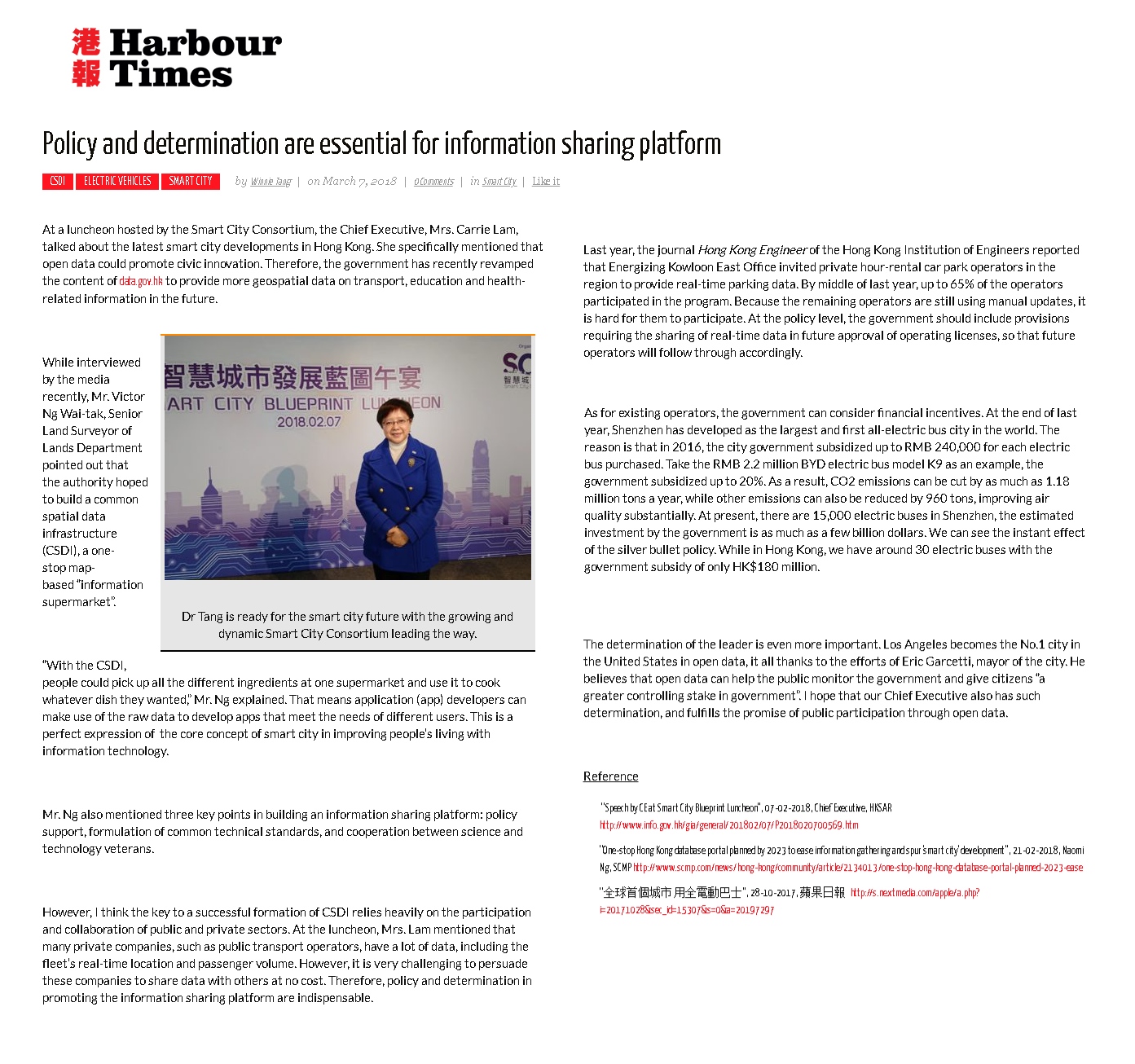網上版請按此

Policy and determination are essential for information sharing platform
At a luncheon hosted by the Smart City Consortium, the Chief Executive, Mrs. Carrie Lam, talked about the latest smart city developments in Hong Kong. She specifically mentioned that open data could promote civic innovation. Therefore, the government has recently revamped the content of data.gov.hk to provide more geospatial data on transport, education and health-related information in the future.
While interviewed by the media recently, Mr. Victor Ng Wai-tak, Senior Land Surveyor of Lands Department pointed out that the authority hoped to build a common spatial data infrastructure (CSDI), a one-stop map-based “information supermarket”.
“With the CSDI, people could pick up all the different ingredients at one supermarket and use it to cook whatever dish they wanted,” Mr. Ng explained. That means application (app) developers can make use of the raw data to develop apps that meet the needs of different users. This is a perfect expression of the core concept of smart city in improving people's living with information technology.
Mr. Ng also mentioned three key points in building an information sharing platform: policy support, formulation of common technical standards, and cooperation between science and technology veterans.
However, I think the key to a successful formation of CSDI relies heavily on the participation and collaboration of public and private sectors. At the luncheon, Mrs. Lam mentioned that many private companies, such as public transport operators, have a lot of data, including the fleet's real-time location and passenger volume. However, it is very challenging to persuade these companies to share data with others at no cost. Therefore, policy and determination in promoting the information sharing platform are indispensable.
Last year, the journal Hong Kong Engineer of the Hong Kong Institution of Engineers reported that Energizing Kowloon East Office invited private hour-rental car park operators in the region to provide real-time parking data. By middle of last year, up to 65% of the operators participated in the program. Because the remaining operators are still using manual updates, it is hard for them to participate. At the policy level, the government should include provisions requiring the sharing of real-time data in future approval of operating licenses, so that future operators will follow through accordingly.
As for existing operators, the government can consider financial incentives. At the end of last year, Shenzhen has developed as the largest and first all-electric bus city in the world. The reason is that in 2016, the city government subsidized up to RMB 240,000 for each electric bus purchased. Take the RMB 2.2 million BYD electric bus model K9 as an example, the government subsidized up to 20%. As a result, CO2 emissions can be cut by as much as 1.18 million tons a year, while other emissions can also be reduced by 960 tons, improving air quality substantially. At present, there are 15,000 electric buses in Shenzhen, the estimated investment by the government is as much as a few billion dollars. We can see the instant effect of the silver bullet policy. While in Hong Kong, we have around 30 electric buses with the government subsidy of only HK$180 million.
The determination of the leader is even more important. Los Angeles becomes the No.1 city in the United States in open data, it all thanks to the efforts of Eric Garcetti, mayor of the city. He believes that open data can help the public monitor the government and give citizens “a greater controlling stake in government”. I hope that our Chief Executive also has such determination, and fulfills the promise of public participation through open data.
Dr. Winnie Tang
Honorary Professor, Department of Computer Science, The University of Hong Kong